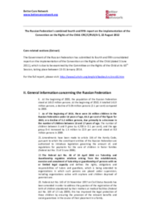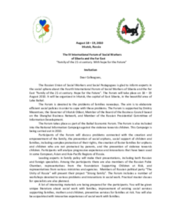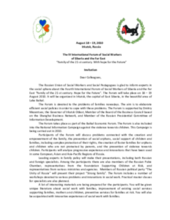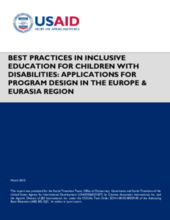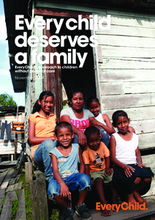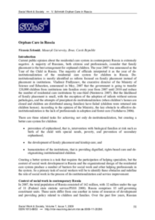Displaying 131 - 140 of 150
Infant Mental Health Journal has published an important Special Issue on Global Research, Practice, and Policy Issues in the Care of Infants and Young Children at Risk. This article documents an initiative to establish a replicable professional model that would direct the child welfare system in the Nizhny Novgorod Region away from institutional care and toward services for young children and their families that reduce the risk of institutionalization.
This Human Rights Watch report gives a detailed overview of the situation faced by children with disabilities in orphanages in Russia.
The Millennium Development Goals will come to an end in 2015 and discussions are currently taking place on what framework will replace them. Children’s participation is crucial to these discussions. Between July 2012 and March 2013, members of Family for Every Child consulted with children living in seven different countries. This report summarizes the main findings that emerged from these consultations.
Care related sections of the Government of the Russian Federation's fourth and fifth combined report on the implementation of the Convention on the Rights of the Child (dated 3rd June 2011).
The Russian Union of Social Workers and Social Pedagogues is glad to inform experts in the social sphere about the Fourth International Forum of Social Workers of Siberia and the Far East “Family of the 21-st century. Hope for the Future”.
The Russian Union of Social Workers and Social Pedagogues is glad to inform experts in the social sphere about the Fourth International Forum of Social Workers of Siberia and the Far East “Family of the 21-st century. Hope for the Future”. The Forum will take place on 18 – 19 August 2010.
The purpose of this study is to provide an overview of best practices in inclusive education, inform stakeholders of the current status of inclusive education in the region, describe the contextual factors which affect program implementation, and make recommendations of practical start-up steps for inclusive education programs.
This document outlines EveryChild’s approach to the growing problem of children without parental care by defining key concepts, analysing the nature and extent of the problem, exploring factors which place children at risk of losing parental care, and examining the impact of a loss of parental care on children’s rights.
The child welfare programs, funded by USAID in Russia, were designed to pilot, disseminate, and help institutionalize modern child welfare services, particularly, child abandonment prevention and professional support of vulnerable children, child welfare institutions, and substitute families. This report reviews program results and sets out recommendations for future program design.
Current public opinion about the residential care system in contemporary Russia is extremely negative. A majority of Russians, both citizens and professionals, consider that family placement is the best arrangement for orphaned children.


